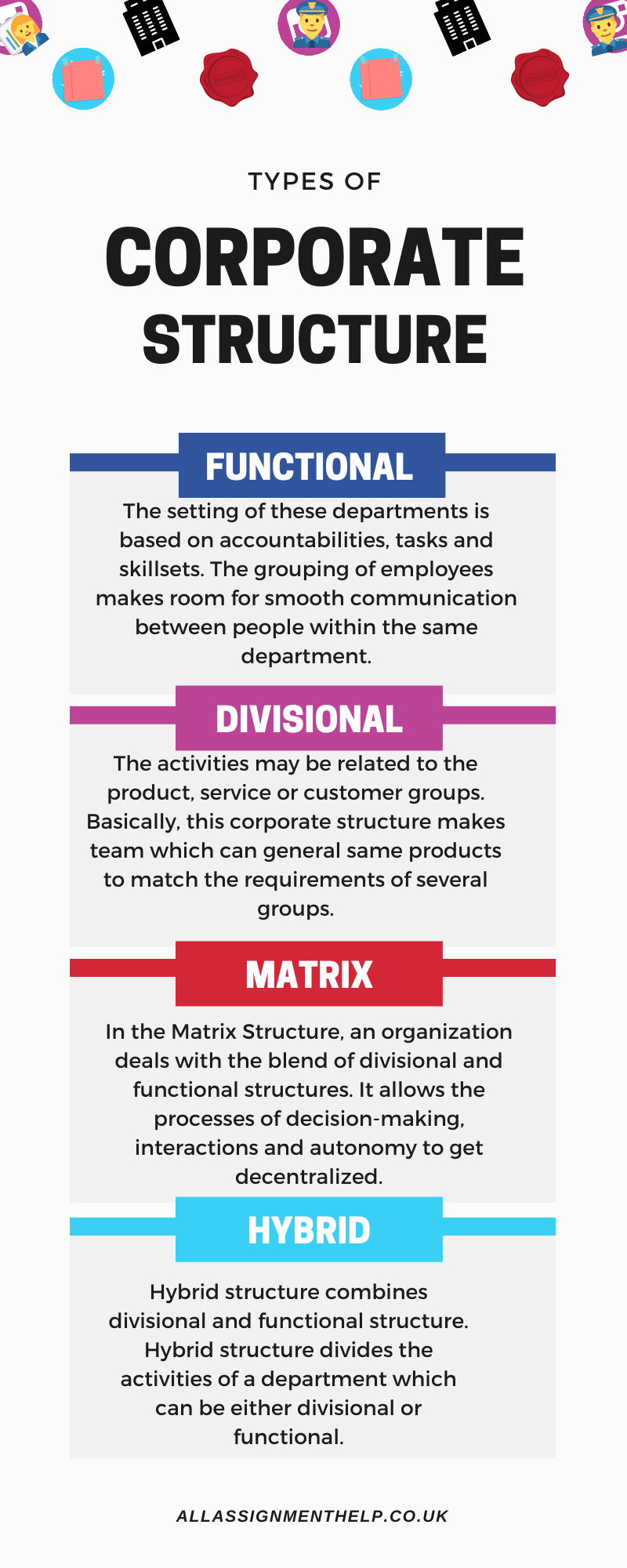Corporate law is the field of rules, laws, practices and regulations that controls the operation and formation of the enterprise. It’s the field of law that controls legal aspects which exist to peacefully conduct business. The laws focus on obligations and rights of all the citizen involving with owning, forming, managing and operating a corporation.
A corporation is a sort of legal entity that is present in society to conduct business. It’s a unique legal entity from the people who create their business and now wants to govern their institutional body using certain regulations. Corporate law is a lengthy ranging practice area that has various aspects. This field of law often describes the law practice relating to the theory of corporations and to the matters that derive directly from the life cycle of a corporation. It thus encompasses funding, formation, governance and death of an enterprise.
At times, students consider corporate law tough to grasp and quit the subject. However, if you are also having such demotivating thoughts, give a read to this article. There are a immense learning opportunities in this branch of law. Plus, there are a number of Law Assignment help options on the internet which can make the study simpler for you. Now, let’s get to know the basics of corporate law in brief:

Introduction
As a corporate lawyer, you need to perform certain responsibilities to perform in the interest of the corporations.
- Acquisitions and Mergers: This includes a huge part of the practice which involves an enterprise either merging another company into it or simply adding an enterprise to its portfolio.
- The incorporation of enterprise: This is the procedure which is applied when a company successfully achieves its personal legal personality in law.
- The restructuring of enterprise: This involves selling off certain parts of the business and their properties with an aim to make it profitable.
- Helping the clients: Assisting the client’s enterprise on the stock exchanges which is around the globe.
- Abiding by the law: Another corporation law matter involves the provisions of enterprise’s law regulation, director’s rights and rights of shareholders.
These fields require prosecutors to work in the process of negotiations, carry out diligence, drafting of agreements a register corporate agreements after the completion of the deal.
Our assignment expert has years of research and experience in Corporate law and can provide a handful of insight for the same.
What makes an apt corporate lawyer?
To thrive in the field of corporate law, you have to develop an extraordinary knowledge of business law, legislative, current trends and regulatory developments.
Also, you have to construct a familiarity with business law and corporate jurisdictions where your clients are looking to invest and where your clients have operations.
A corporate lawyer tries to have negotiation skills and strong communication. As a proficient lawyer with an outstanding background, you need to have the ability to think outside of the box. Meticulous attention of everything and exceptional analytic skill is required.
Teamwork is also an important aspect of nearly every corporate transactions. The corporate attorney needs to work with various teams of professionals who share a common goal. Therefore the people and interpersonal management skill need to be top-notched.
An excellent corporate lawyer thrives on problems, is ambitious and chases his aim relentlessly. If you need to make big bucks than corporate law is for you. However, if you study to commit to this field of law, it is obvious that the field is competitive and you have to give insane hours under immense pressure.
Corporate structure
The law of business organization normally derives from the common law of England. It has evolved particularly in the 20th century. In common law countries these days, the known commonly addressed forms are:
- Limited Company
- Unlimited company
- Corporation
- Limited partnership
- Not-for-profit Organisation
- Sole Proprietorship
- Partnership
- Limited Liability Partnership
The proprietary limited enterprise is a Legal business aspect in several countries. Many economies have forms of a business entity different from other countries, although there are numbers of similarities. For instance the limited liability partnership (LLLP) and limited liability company (LLC) in America. Other sorts of business organization such as credit unions, cooperatives and publically owned enterprise. It can be established with the aim of supersede, parallel or even change the profit maximization of a business corporation.
There are different sorts of the company that are formed in various jurisdictions, but the most known forms of an organization are:
An enterprise backed by a guarantee
Normally used where most of the companies are known for non-commercial aims, such as charities and clubs. The executives in the organisation make sure the payments of the specific amount if the company proceeds towards insolvent liquidation. Although they have no sort of economic freedom in relation to the enterprise.
A company backed by the guarantee with a hold of share capital
It is referred to as a hybrid entity which is normally used where the enterprise is formed for non-commercial aim. On the other hand, activities are partially funded by big investors who expect a return.
An enterprise limited by shares
It is the most favoured business form where an enterprise is used for a business venture.
An unlimited Company is either with or without share capital
A more hybrid form where a company is equivalent to a limited company. While the shareholders or members do not get any benefit from limited liability if the enterprise ever proceeds to formal liquidation.
There are moreover, number of specific categories of business organisations and cooperation which can be formed in different economies throughout the world.
Types of Corporate Structure

Mainly, there four types of corporate structure which are used by businesses all across the globe. Have a look at them:
Functional Structure
Under this corporate structure, the employees of an organization are grouped into departments. The setting of these departments is based on accountabilities, tasks and skillsets. The grouping of employees makes room for smooth communication between people within the same department. You can refer to the IT and Accounting as great examples of functional structure.
Divisional Structure
The next structure is called a divisional structure wherein it gets easier to organize different business activities into a particular market. The activities may be related to the product, service or customer groups. Basically, this corporate structure makes team which can general same products to match the requirements of several groups. The geographical structure can be considered as the best example of a divisional structure. In a geographical structure, an organization builds regional divisions to ensure the availability of certain goods and services to particular locations.
Matrix Structure
In the Matrix Structure, an organization deals with the blend of divisional and functional structures. This one allows the processes of decision-making, inter-departmental interactions and autonomy to get decentralized. Thus, it facilitates innovation and productivity to a great extent. However, there are some disadvantages of a matrix structure. This corporate incur higher costs and thus, not feasible to small-scale businesses. This may further result in conflicts between horizontal product lines and vertical functions.
Hybrid Structure
Just like the matrix structure, the Hybrid structure combines divisional and functional structure. Hybrid structure divides the activities of a department which can be either divisional or functional. It allows optimum utilization of resources and knowledge in all functions. It also maintains the process of product specialization in various divisions. Due to its benefits, it is highly adopted by large-scale businesses.
Powers and Capacities of Corporate Law
From the earlier time, companies are an imaginary person created by the proceedings of law. The law defines what the enterprise could and could not do. Normally this is an expression of commercial purpose for which company is formed. It is referred to as the company’s main resolutions and objectives. The extent of these objectives is known as the company’s capacity. If in case a business venture fells outside of the company’s capacity, it is said to void or ultra vires.
By the same logic of distinction, the various organs of an enterprise are expressed to attain various corporate powers. Usually, the expressions of powers are limited to the techniques of raising the Capital of enterprise. Most of the jurisdictions have modified the position of companies and statue and the enterprise normally have the capacity to perform all the things any natural person can perform.
On the other hand, references to enterprise power and capacities have not established. Still, the director is liable to their shareholders in case the same enterprise engage in business activity against its object. The transactions that occur between the corporation and the third party is considered valid.
Conclusion
Corporate law is known as the big cat territory, and as a future barrister, you have to demonstrate an edge. Before you even start practising, you need to retain that edge and ensures your knowledge stays relevant and current.
Either way, you need to be focused and driven, make the best choice. To succeed and stand out in a very competitive profession.
Note: If you find corporate law is tough to understand, you can get assistance from our experts. Our Assignment help Uk portal offers a 15-day free revision policy, after submitting your project.
